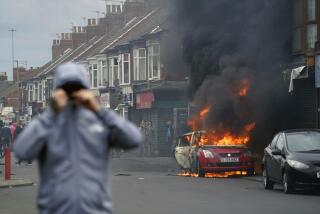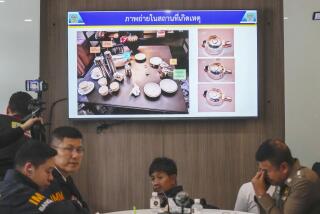Lakeshore resort in Afghanistan shattered by violence
KABUL, Afghanistan — To the people ofAfghanistan’s teeming, dusty capital, sparkling blue Lake Karga on the city’s outskirts has long been a tranquil haven.
But in a brazen evening attack, a team of Taliban assailants turned the quiet lakeshore into a scene of horrors, storming a popular hotel, seizing dozens of hostages and killing 18 people, most of them diners relaxing over a late-night meal.
The 11-hour siege of the Spozhmai resort, the latest in a series of high-profile insurgent strikes around the capital in recent months, ended Friday when elite Afghan police supported by NATO troops killed the last of the attackers.
Though the North Atlantic Treaty Organization and the country’s government hailed Afghan forces for preventing even more fatalities, the attack was graphic demonstration that insurgents can still strike seemingly at will. Their reach leaves many Afghans feeling jittery and fearful as the U.S.-led NATO force begins pulling out.
In claiming responsibility for the attack, the Taliban described the hotel as a “hub of obscenity and vulgarity,” a description that harked back to the deeply conservative movement’s five-year rule over Afghanistan before being dislodged by the 2001 U.S.-led invasion. Under its harsh interpretation of Islam, a place where men and women mingle and dine together, and where guests are permitted to consume illicitly procured alcohol on the premises, is seen as an abomination.
The victims were also apparently targeted for who they are: well-educated, affluent and cosmopolitan, representing an elite class generally supportive of President Hamid Karzai’s government and the presence of Western troops in Afghanistan. Targeting them was explicit warning that once the NATO force is gone, they will be defenseless.
The Afghan government issued a blistering statement blaming “brainwashed terrorists” based in Pakistan for the attack. Gen. John Allen, the U.S. Marine who commands Western troops in Afghanistan, said the assault “bears the signature” of the Haqqani network, a Taliban offshoot with its home base in Pakistan’s tribal areas.
Evidence of a link to Pakistan could further inflame tensions between the U.S. and the Pakistani security establishment.
In the aftermath of the attack, the picturesque hotel lay in ruins, its facade blasted away, floors sticky with blood, furniture smashed and shattered glass and shell casings littering the ground. Bodies lay heaped and scattered amid the debris of half-finished meals and forlorn possessions: here a handbag, there a shoe.
The attack began shortly before midnight Thursday. By some witness accounts, the assailants initially wore all-enveloping blue burkas to disguise themselves and buy a few moments of confusion, throwing off the garments when they stormed into the hotel. First reports put the number of attackers at seven; the government later reduced that to four.
Heavily armed and wearing suicide vests, the gunmen swiftly seized control of the hotel, leading to a battle that continued until the following midmorning. Several hundred people were inside the complex at the time, including dozens attending a private party in the dining hall that was targeted.
Many were cut down while they tried to flee as the room was sprayed with bullets; some saved themselves by jumping out windows and into the lake. At least one of the attackers blew himself up in the course of the assault.
Survivors described the terrifyingly methodical execution of some diners, mainly men, who pleaded for their lives but were shot point-blank. In a sign of the lethal efficiency of the assailants, only five people were reported wounded, including a police officer taking part in the rescue operation.
Dozens of people were seized as hostages, and survivors said the gunmen ranted about pimps and prostitutes who they insisted were present in the hotel. A 14-year-old waiter named Ebadullah said that after killing the security guards, attackers cornered him in an adjacent room and demanded to know where the “adulterous bastards” were.
“I told them, ‘I don’t know, Uncle,’ ” he said.
They left him alive, and he spent the long night crouching alone, listening to the din of gunshots and explosions. “I was frightened to death,” he said.
The Taliban claimed that foreigners were among the dead, but Afghan authorities said all those killed were Afghans. After the siege finally ended, weeping relatives gathered outside the hotel, waiting to claim the bodies.
Abdullah Shah, in his 60s, lost his son, a government worker who was married with five children. “Last night he came here with his friends, and this morning we heard that he was killed,” he said.
NATO sent in special operations troops and helicopters to aid Afghan forces. But Western military officials were careful to characterize the rescue operation, in which one Afghan police officer was killed, as Afghan-led. A similar attack last summer on a landmark Kabul hotel ended after international troops intervened, providing helicopters and commandos.
Although there were guards posted at the entrance and security checks for those arriving, the resort was a vulnerable target. Thursday evening is the start of the Afghan weekend, when families flock to Lake Karga, picnicking by the water, renting pedal-powered boats or dining in the hotels and restaurants that dot the shore.
“The Taliban targeted a safe picnic spot — for them it was a very soft target,” said Interior Ministry spokesman Seddiq Seddiqi.
Condolences poured in from government officials and Western organizations. Karzai said the attack represented “failure” on the part of “the enemies of Afghanistan,” the government’s usual term for the Taliban and other insurgent groups.
Allen offered sympathies to the families of “those defenseless Afghans who were murdered” and scoffed at the Taliban claim that it had aimed to kill dignitaries and military and government officials.
“There is no doubt that innocent Afghan civilians were the intended targets of this unspeakably brutal attack,” he said.
Times staff writer King reported from Kabul and special correspondent Yaqubi from Lake Karga.
More to Read
Sign up for Essential California
The most important California stories and recommendations in your inbox every morning.
You may occasionally receive promotional content from the Los Angeles Times.










